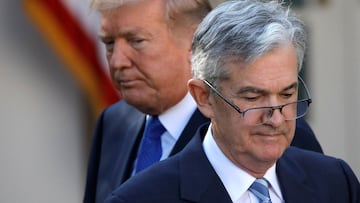The reason why the Federal Reserve cut interest rates two days after the presidential election
A reduced cost of borrowing is not affected by an upcoming Trump presidency, but will be altered by measures he takes in office.


The Federal Reserve’s decision to cut interest rates just two days after the 2024 presidential election has nothing to do with the election. This move, lowering the federal funds rate by a quarter percentage point to a range of 4.5% to 4.75%, marks the second rate cut of 2024.
The primary motivation behind the Fed’s rate cut is the continued cooling of inflation. With the Fed’s preferred inflation measure dropping to 2.1% last month, just shy of its 2% target, the central bank is easing off the monetary policy brakes it applied when inflation hit a 40-year high during the pandemic.
BREAKING: Fed cuts interest rates by .25% pic.twitter.com/GixDVedSzE
— MSNBC (@MSNBC) November 7, 2024
This “recalibration” to a lower-inflation environment is part of the Fed’s strategy to maintain economic stability while avoiding excessive tightening. The rate cut is generally seen as positive news for investors and consumers as lower interest rates boost stock prices by reducing borrowing costs for companies and increasing consumer spending power.
Impact on homeowners
For those in the market to buy a home, the reduction in mortgage rates can translate into substantial savings over the life of a loan. Lower rates decrease monthly mortgage payments, making homeownership more affordable. For example, a 1% reduction in mortgage rates can save borrowers hundreds of dollars per month, depending on the loan amount.
Homeowners with adjustable-rate mortgages (ARMs) or those considering refinancing their existing loans stand to benefit significantly from the rate drop. Refinancing at a lower rate will reduce monthly payments and the total interest paid over the loan’s life. For instance, refinancing a $300,000 mortgage from 6.5% to 5.5% can save more than $200 per month and over $70,000 in interest over 30 years.
Pretty concerning how low homebuyer demand is right now.
— Nick Gerli (@nickgerli1) November 6, 2024
Mortgage apps to buy a house are down 45% from pre-pandemic levels.
Languishing at lowest level in 30 years.
And now mortgage rates are spiking again. pic.twitter.com/yaoIYDFn6m
Related stories
While the recent decline is promising, experts caution that mortgage rates are unlikely to return to the historically low levels seen during the pandemic, when rates dipped below 3%. However, the current trend suggests that rates may continue to ease, providing further relief to borrowers.
Housing economists predict that if inflation remains under control and the Federal Reserve makes rate cuts, mortgage rates could stabilize around the 5-6% range.


Complete your personal details to comment